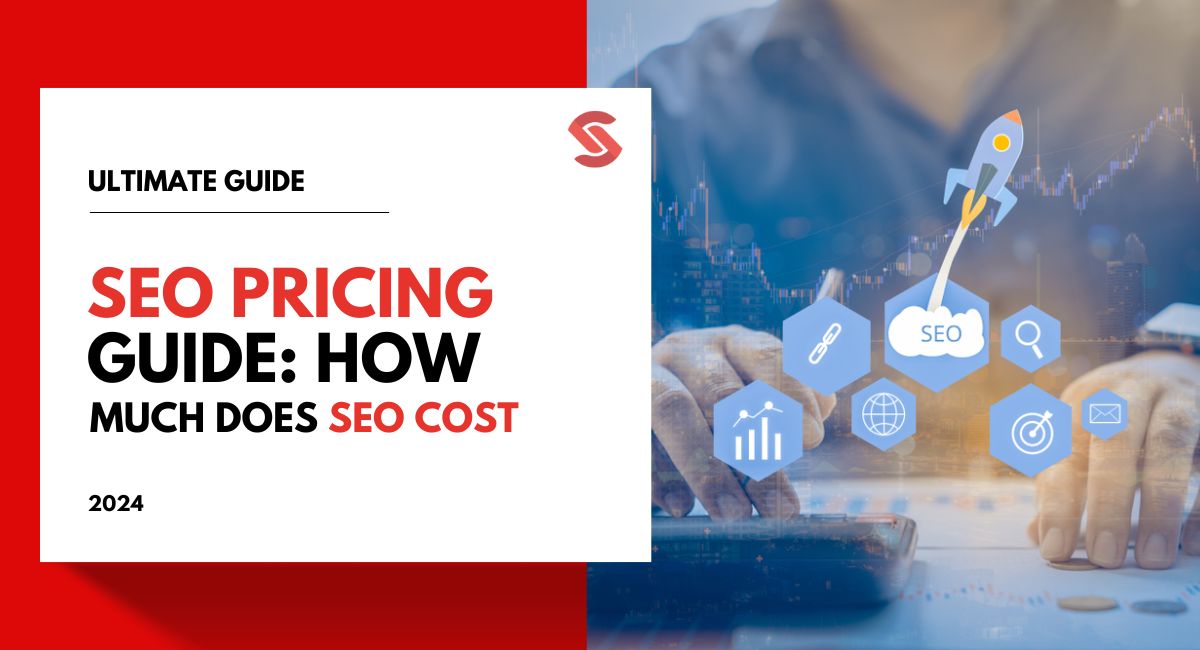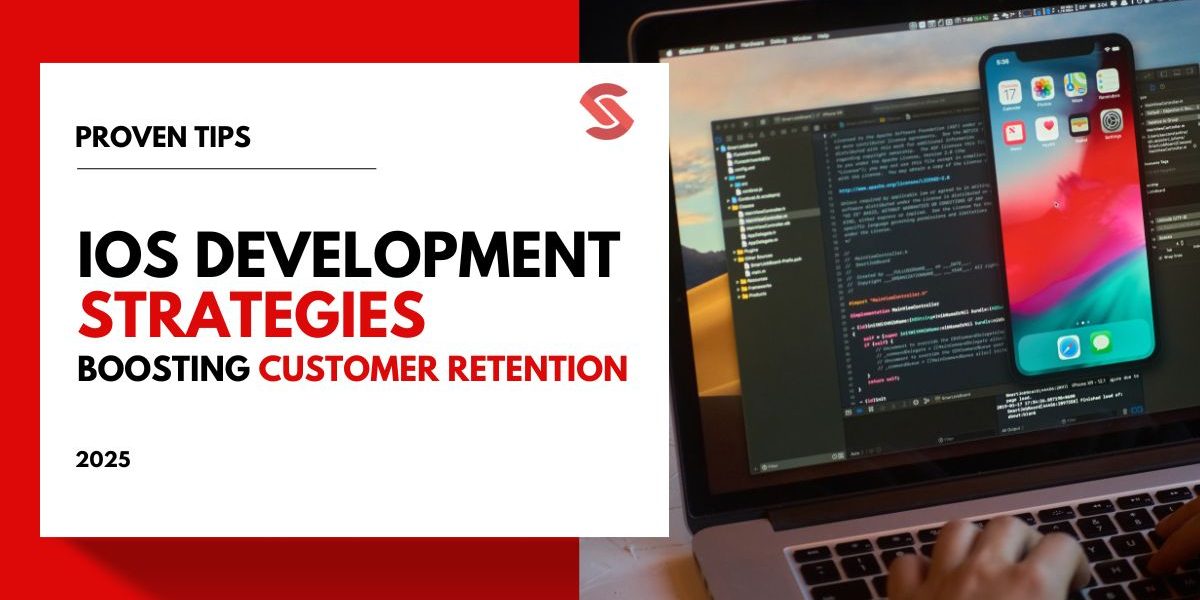According to a survey by Search Engine Journal, many companies invest more to achieve the desired results. But you don’t need to overspend. I’ve got you covered. Affordable SEO services can be tricky to find, but I’ll break it down for you. By the end of this guide, you’ll understand what SEO is, why it’s important, and how much it typically costs. Stick around to learn the true cost of SEO without any surprises.
Introduction to SEO Pricing
When planning your digital campaign budget, it’s crucial to understand SEO pricing. SEO costs can vary, offering options like fixed pricing, hourly rates, or monthly retainers. Both SEO agencies and freelancers provide diverse packages to match various needs.
This helps in making informed choices about costs like keyword research, on-page optimization, and link building, ensuring your investment enhances your business’s online presence effectively.
Brief Overview of SEO Pricing in 2024
SEO pricing in 2024 reflects recent changes and anticipates future trends. Costs have evolved with market dynamics, emphasizing more tailored and value-focused packages to accommodate varying business needs. This year, the emphasis is on comprehensive SEO services that promise more targeted results. Here are some notable trends for 2024:
- Increased reliance on detailed cost analysis to shape pricing strategies.
- A shift towards more personalized SEO packages that cater to specific business requirements.
- Predictions point towards rising costs due to the integration of advanced technologies and more sophisticated SEO strategies.
Importance of Understanding SEO Costs
Understanding SEO costs is crucial for effective business budgeting. Knowing what you pay for helps in realizing the long-term benefits, such as improved website traffic and increased sales. Common misconceptions often lead businesses to underestimate the strategic importance of a good SEO investment. Here’s what businesses should consider:
- Investing in SEO should be seen as a long-term commitment with potential returns that increase over time.
- Proper budgeting for SEO helps avoid overspending and ensures that investments are made wisely to yield the best results.
- By debunking common myths about SEO costs, businesses can make more informed decisions, leading to smarter financial planning and better allocation of resources.
Average Costs for SEO Services
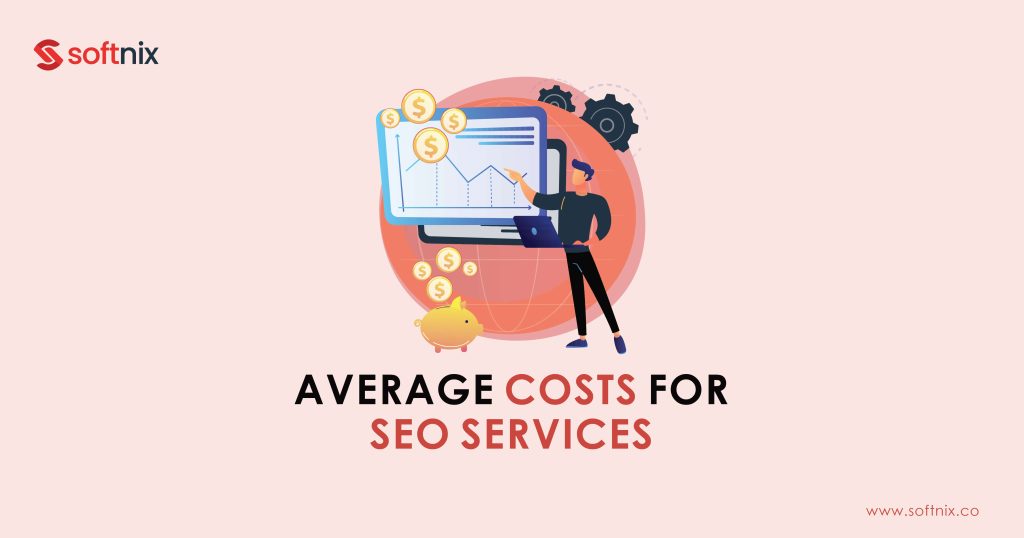
1. Basic SEO Services: $300-$500 per Month
For small businesses and startups, basic SEO services priced between $300 and $500 per month provide essential tools to enhance online visibility. These services typically include keyword research, basic on-page optimization, and initial content creation, offering a solid starting point for new businesses looking to establish an online presence. You can find more information in our guide to SEO services for businesses. But this level of SEO support is ideal for:
- Establishing a foundation in SEO practices for new businesses.
- Offering cost-effective solutions that are both affordable and accessible.
- Providing an introductory package that helps small businesses start ranking on search engines.
These services are designed to introduce the fundamentals of SEO in a straightforward, accessible way, allowing small businesses and startups to begin building their online visibility without a significant initial investment.
2. Mid-range SEO Services: $1,500-$2,500 per Month
Mid-range SEO services, ranging from $1,500 to $2,500 per month, cater to growing businesses operating in competitive industries or those with a regional focus. Including advanced on-page optimization, technical SEO, and strategic link building, these services are structured to support businesses aiming for more aggressive growth. Benefits for businesses at this level include:
- Enhanced capability to compete in tougher markets.
- Focused efforts on growth and expanding online presence.
- Strategic advancements in SEO that provide a balance of cost and effectiveness.
Choosing mid-range SEO services allows businesses to tackle more complex SEO challenges and enhances their ability to rank in competitive sectors, ultimately supporting sustained business growth.
3. Enterprise SEO Services: $3,000-$5,000+ per Month
For large organizations requiring a comprehensive SEO strategy, enterprise SEO services start from $3,000 and can exceed $5,000 per month. These extensive services include full-scale SEO strategies, international SEO, and expansive content marketing efforts, tailored to meet the demands of large-scale operations. Key aspects of enterprise SEO include:
- Development of a detailed, data-driven SEO approach.
- Access to dedicated resources tailored to large-scale operations.
- Strategies designed to maintain and enhance global online visibility and market dominance.
This level of SEO service ensures that large enterprises can leverage their scale and reach, applying sophisticated strategies that drive significant traffic and effectively position them as leaders in their respective industries globally.
15 Factors Influencing SEO Costs
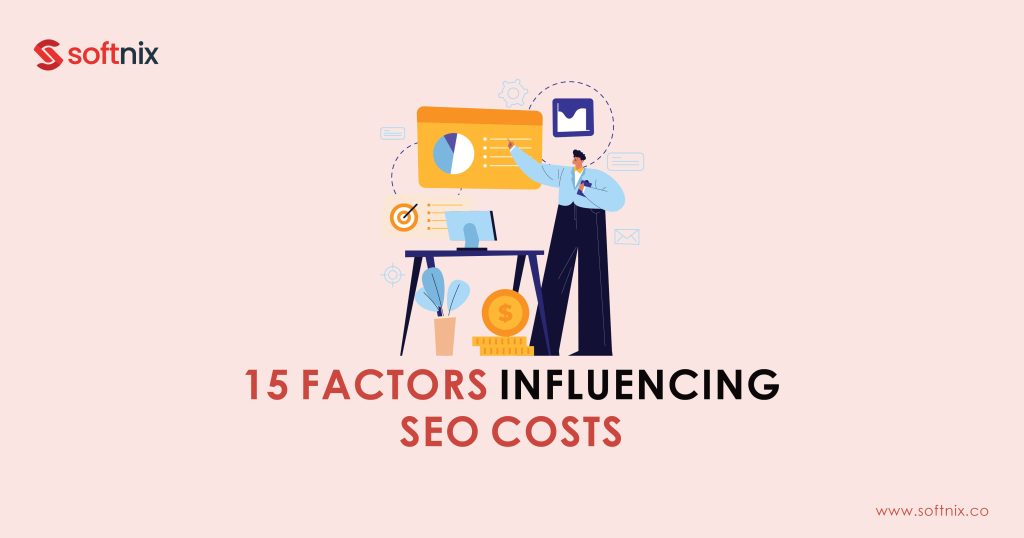
Factors influencing SEO costs include company size, industry type, competition level, and website complexity. Geographic location and the scope of services also significantly affect pricing. Understanding these elements helps effectively plan your SEO budget.
1. Industry and Competition Level
SEO costs vary significantly across different industries due to varying levels of competition. High-competition industries like finance and real estate often see higher SEO pricing due to the need for more advanced strategies to stand out. Conversely, less competitive markets might incur lower costs. Key points include:
- High competition drives up SEO costs due to greater effort in differentiation.
- Industries with lower competition may have more basic and cost-effective SEO needs. Understanding the competitive landscape helps tailor SEO strategies effectively, ensuring businesses invest appropriately to achieve visibility in their specific market.
2. Geographic Location
The cost of SEO can differ based on whether the focus is local, national, or international. Local SEO might cost less but is crucial for businesses targeting nearby customers. International SEO, aiming at a global market, typically requires a larger budget. Considerations include:
- Local SEO is less expensive but vital for community-focused businesses.
- National and international SEO require more extensive and costly strategies. Geographic considerations ensure that businesses target the right audiences efficiently, maximizing the return on their SEO investments based on their specific location needs.
3. Scope and Type of SEO Services
The scope and type of SEO services can encompass on-page, off-page, technical, and content SEO, each contributing uniquely to an integrated strategy. The complexity and range of services chosen directly influence the cost. Essential aspects include:
- On-page and off-page SEO help improve site visibility and link quality.
- Technical and content SEO enhances site functionality and relevance. Businesses must choose the right mix of services to effectively meet their SEO goals, balancing between comprehensive strategies and budget constraints.
4. Current Brand Awareness and Visibility
SEO costs are influenced by a brand’s existing market presence. New brands might need more intensive SEO to build visibility, while established brands might focus on maintaining or expanding their presence. Points to consider are:
- New brands require more resources to build awareness.
- Established brands invest in SEO to maintain or enhance visibility. The starting point in terms of brand awareness significantly impacts SEO strategies and their associated costs, with clear goals set based on current visibility.
5. Website CMS and Existing Content Quality
The compatibility of a website’s CMS with SEO and the quality of existing content are crucial. A CMS that is not SEO-friendly may require more technical work, and poor content quality might necessitate extensive rewriting or updating. Factors include:
- The need for CMS adaptations or overhauls to support SEO.
- The quality of existing content dictates the extent of required optimizations. Choosing the right CMS and maintaining high content quality reduce the need for costly overhauls and ensure smoother, more effective SEO integration.
6. Business Goals and Objectives
SEO strategies should be closely aligned with specific business goals and objectives, influencing both the scope and cost of services. Whether aiming for quick wins or long-term growth, SEO efforts must be tailored to these goals. Key considerations are:
- Immediate goals might require aggressive, higher-cost strategies.
- Long-term objectives align with sustained, strategic SEO efforts. Aligning SEO with business goals ensures that efforts are not just tailored but also cost-effective, driving desired outcomes in line with company objectives.
7. Urgency of Results
The urgency of achieving SEO results can significantly impact costs. Businesses needing quick improvements may opt for more aggressive, and often more expensive, strategies. Important aspects to consider are:
- Immediate results require fast, intensive, and often costly SEO tactics.
- Long-term strategies focus on gradual improvements and are usually more budget-friendly. The urgency of SEO results dictates the strategy and pricing, with businesses needing to balance speed and investment according to their specific timeline requirements.
8. Target Audience and Demographics
Tailoring SEO strategies to the needs and behaviors of a specific audience or demographic is crucial. This customization ensures that SEO efforts are not only effective but also resonate with the target audience. Points to focus on include:
- Understanding audience preferences helps in creating relevant content and keywords.
- Demographic targeting ensures that SEO efforts reach the most receptive audience. Customizing SEO for specific audiences enhances engagement and effectiveness, ensuring that strategies are not just targeted but also resonate well with the intended users.
9. Website Size and Complexity
The size and complexity of a website can greatly influence SEO costs. Larger sites with many pages or complex structures require more extensive SEO efforts. Considerations include:
- Larger websites need more comprehensive strategies and often incur higher costs.
- Smaller sites might benefit from simpler, more cost-effective SEO approaches. Understanding the scale and complexity of a website helps in planning effective SEO strategies that are both efficient and appropriately priced.
10. Content Strategy and Needs
An effective content strategy is vital for ongoing SEO success. Continuous content creation and optimization are essential for keeping a website relevant and engaging. Key points include:
- Regular content updates and optimizations keep a site fresh and competitive.
- Strategic content planning aligns with overall SEO and business goals. Investing in a continuous content strategy ensures that a website remains relevant and competitive, adapting to evolving market conditions and audience preferences.
11. Technical SEO Requirements
Technical SEO aspects like website speed, mobile-friendliness, and other backend elements are critical for a site’s performance. These technical requirements must be met to ensure user satisfaction and compliance with search engine standards. Factors to consider are:
- Enhancements in website speed and mobile optimization improve user experience.
- Technical compliance is essential for maintaining search engine rankings. Focusing on technical SEO ensures that a website not only performs well but also provides a seamless experience that meets both user and search engine expectations.
12. SEO Campaign Duration
The duration of an SEO campaign, whether short-term or long-term, affects the strategy and overall costs. Sustained efforts usually lead to more enduring benefits. Points to consider are:
- Short-term campaigns may require a larger immediate investment for quick results.
- Long-term campaigns are designed for gradual improvements and sustained growth. Choosing the right campaign duration aligns SEO efforts with business timelines, balancing immediate needs and long-term goals for optimal results.
13. Mobile Optimization
Mobile optimization is essential as mobile traffic continues to rise. Strategies for mobile SEO must ensure that websites are responsive and user-friendly on all devices. Key aspects include:
- Responsive design is crucial for engaging mobile users.
- Mobile optimization impacts both user experience and search engine rankings. Prioritizing mobile optimization ensures that a website is accessible and performs well across all devices, meeting the expectations of a modern, mobile-first audience.
14. Voice Search Optimization
Preparing for the rising trend of voice search is becoming increasingly important. Optimizing for voice search involves understanding and implementing conversational search techniques. Important considerations are:
- Voice search requires SEO strategies that understand natural language patterns.
- Optimizing for voice can place a website at the forefront of emerging search trends. Adapting to voice search helps businesses stay competitive in an evolving SEO landscape, ensuring that they capture traffic from this growing mode of search.
15. Multilingual SEO Needs
For businesses targeting multiple languages and regions, multilingual SEO is essential. This approach ensures that content is optimized for different languages, meeting the needs of a global audience. Key factors include:
- Multilingual SEO broadens a website’s reach and accessibility.
- International targeting requires specific strategies for each language and region. Implementing multilingual SEO strategies allows businesses to expand their reach globally, ensuring that content resonates with diverse audiences and meets the specific needs of each targeted region.
SEO Pricing Models
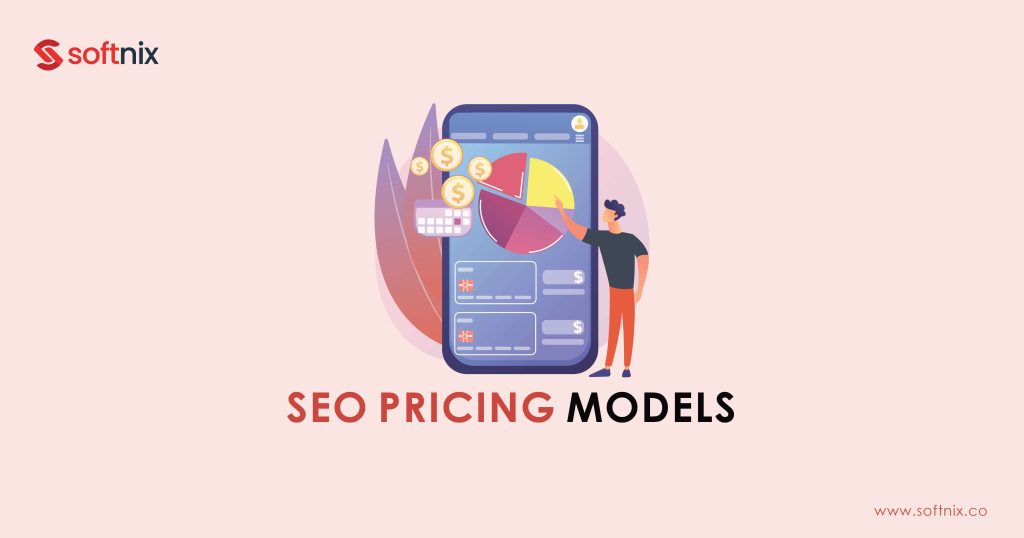
There are four main types of SEO pricing models to consider for your business: fixed pricing, hourly rates, monthly retainers, and performance-based models. Each option caters to different needs and budgets, making it essential to choose the right one to maximize the value and effectiveness of your SEO efforts.
Retainer-Based SEO Pricing
Retainer-based SEO pricing is commonly adopted by businesses looking for sustained SEO efforts with a consistent monthly fee. This model covers ongoing services like keyword monitoring, content updates, backlink analysis, and technical site adjustments. It is particularly effective for businesses that prioritize long-term search visibility and want to steadily climb search rankings. Key benefits and considerations include:
- Stability with consistent SEO efforts ensuring ongoing optimization and adaptation.
- Predictability in budgeting with fixed monthly costs.
- Continuous improvement of SEO strategies based on performance analytics.
- Long-term partnership with SEO providers for ongoing support and advice.
This pricing model is ideal for businesses that value consistency and sustained effort in their SEO strategy, allowing them to plan financially and strategically with greater certainty. It fosters a strong relationship with service providers, leading to deep understanding and alignment with business goals.
SEO Hourly Rates
SEO hourly rates are flexible and allow businesses to pay for specific SEO services as needed. This model is effective for companies with variable SEO needs or those looking to address specific areas without committing to a long-term contract. Services typically charged by the hour include site audits, keyword research, and single-issue troubleshooting. Key aspects include:
- Flexibility to adjust the scope of work based on immediate needs and budget.
- Cost-effectiveness for businesses with intermittent SEO requirements.
- Direct correlation between hours worked and payment, ensuring clear accountability.
- Suitable for small-scale or trial SEO efforts before committing to larger investments.
Hourly rates offer the advantage of scalability, making it easy for businesses to start small and increase investment as they see tangible results. This model is particularly appealing to new businesses or those experimenting with SEO strategies.
Per-Project SEO Pricing
Per-project SEO pricing is tailored for specific, finite tasks or campaigns with clear start and end dates. This model is perfect for businesses undertaking defined projects like website launches, redesigns, or focused marketing campaigns. Projects often include comprehensive site overhauls, targeted content creation, and strategic link-building efforts. Pros and cons include:
- Fixed pricing provides clarity and control over budget.
- Goals and outcomes are clearly defined from the outset.
- Enhanced focus on achieving specific objectives within set timelines.
- Simplifies the process of measuring ROI on specific projects.
This pricing structure is highly effective for project-based work where objectives are clear and bounded by time. It allows businesses to allocate specific budgets to discrete SEO initiatives, making it easier to track effectiveness and justify investment.
One-Time SEO Costs
One-time SEO costs are ideal for initial setups, major overhauls, or specific optimizations that do not require ongoing attention. Typical services under this model include comprehensive site audits, initial optimization for new websites, and major updates following algorithm changes. Important factors include:
- Essential for establishing a strong SEO foundation or addressing major issues.
- Cost-effective for businesses making one-time investments in SEO.
- Provides a thorough assessment of current SEO performance and needs.
- Allows businesses to make significant one-time improvements with lasting benefits.
Investing in one-time SEO services is crucial for new websites or those undergoing significant changes. It provides a snapshot of current performance and a roadmap for necessary improvements, setting the stage for future SEO efforts and long-term digital strategy.
3 Example SEO Plans
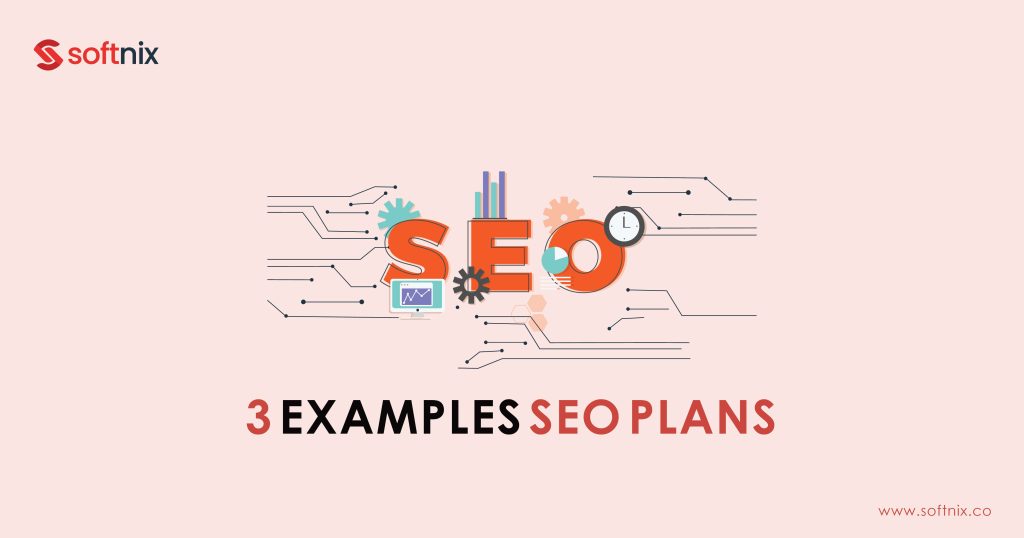
While many SEO plans exist, agencies and freelancers typically offer four main types. These plans range from basic setups for small businesses to comprehensive strategies for large enterprises. Each plan is designed to meet different needs, ensuring that every business can find an option that fits their goals and budget. This approach helps make SEO accessible and effective for a variety of business types.
1. Basic SEO Plan
The Basic SEO Plan is designed for small businesses and startups that need essential SEO services without a hefty price tag. It includes keyword research, basic on-page optimization, and content updates. This plan is perfect for businesses looking to establish a digital presence efficiently. Key points include:
- Focus on foundational SEO tasks like keyword setup and basic site optimization.
- Cost-effective for small businesses and startups.
- Provides a scalable foundation to build more complex SEO strategies later.
This plan makes SEO accessible and affordable, allowing small businesses to start improving their search rankings without a large initial investment. It’s a stepping stone towards more advanced SEO efforts as the business grows.
2. Mid-Range SEO Plan
The Mid-Range SEO Plan caters to growing businesses that require a more detailed approach to SEO. This plan typically includes advanced on-page optimization, technical SEO adjustments, and strategic link building. It is aimed at businesses ready to expand their market reach and compete in more competitive environments. Highlights of this plan include:
- Inclusion of comprehensive SEO services that support business growth.
- Strategic content development and link acquisition to enhance authority.
- Tailored to the needs of businesses outgrowing their initial market boundaries.
This plan supports businesses in a growth phase, offering strategic and effective SEO solutions that help them stand out in their industry and attract more traffic.
3. Enterprise SEO Plan
The Enterprise SEO Plan offers a comprehensive and customized strategy suitable for large enterprises with complex needs. This plan involves a full-scale SEO strategy, including international SEO, extensive content marketing, and ongoing analytics. It is designed for companies needing a robust approach to dominate competitive industries. Key features are:
- Full-service SEO offerings, including global strategy development.
- Customized solutions tailored to the specific demands of large businesses.
- Focus on long-term results and continuous improvement.
This plan provides enterprises with a deep and extensive SEO strategy that integrates all aspects of digital marketing to maintain and enhance their market leadership. It ensures that large companies can effectively manage their online presence on a global scale.
Comparison Table for Examples of SEO Plans
Here’s a comprehensive comparison of SEO plans to help you choose the right fit for your business needs.
| Plan | Basic SEO Plan | Mid-Range SEO Plan | Enterprise SEO Plan |
|---|---|---|---|
| Services | – Keyword Research | – Advanced On-page Optimization | – Full-scale SEO Strategy |
| – Basic On-page Optimization | – Technical SEO | – International SEO | |
| – Content Creation | – Link Building | – Extensive Content Marketing | |
| – Monthly Reporting | – Content Marketing | – Data-driven SEO Approaches | |
| – Monthly Reporting | – Dedicated SEO Resources | ||
| Pricing | $300-$500 per month | $1,500-$2,500 per month | $3,000-$5,000+ per month |
| Best For | Small businesses and startups | Growing businesses and regional focus | Large enterprises and highly competitive industries |
Service-Specific SEO Pricing
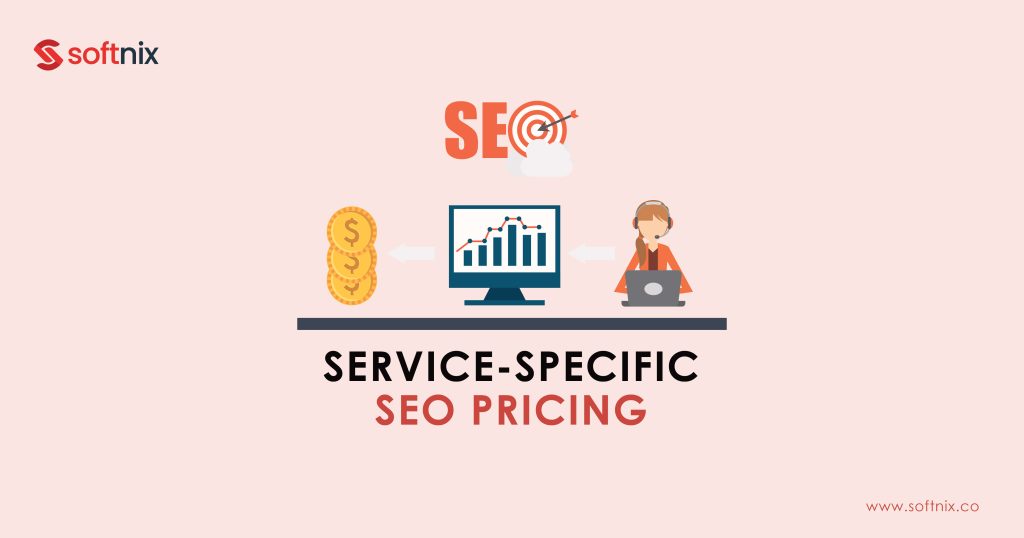
SEO pricing can vary widely because it depends on different factors like the amount of work needed, the time it takes, the level of expertise required, and the industry competition. Each SEO plan is priced based on how much effort and skill it demands to effectively boost your website’s presence and performance in search engines. Understanding these variations helps in choosing the right plan for your business needs.
1. Local SEO Pricing
Local SEO pricing varies depending on the scale and complexity of the services needed. For basic automated local SEO, prices range from $300 to $500 per month, ideal for small businesses targeting local consumers. Small-scale local SEO services, which offer more comprehensive regional optimization, typically cost between $1,500 and $2,500 per month. For a full-scale, comprehensive local SEO strategy, prices can escalate to between $3,000 and $5,000 per month. Key points include:
- Tailored strategies for different levels of local market engagement.
- Pricing scales with the depth of service and market coverage.
- Focus on enhancing local visibility and attracting nearby customers.
These tiers allow businesses to select a plan that matches their local presence needs, optimizing their investment based on specific local market goals.
2. eCommerce SEO Pricing
eCommerce SEO requires specific strategies tailored to online stores, with pricing reflective of the unique demands of product optimization and customer conversion. Costs typically start around $2,000 per month for basic eCommerce SEO services and can rise to $5,000 or more for advanced, comprehensive strategies. Essential considerations include:
- Specialized SEO strategies focused on product pages and user experience.
- Integration of SEO with other digital marketing efforts to boost online sales.
- Detailed attention to product descriptions, categories, and metadata for better search visibility.
eCommerce SEO is crucial for online retailers looking to stand out in a crowded market, with strategic investments often translating directly into increased sales and customer engagement.
3. International SEO Pricing
International SEO pricing factors in the complexity of targeting multiple countries and languages, making it one of the more expensive SEO services. Costs for global campaigns typically start from around $5,000 per month and can extend much higher, depending on the scope and number of regions targeted. Key aspects include:
- Multilingual and regional optimization to cater to diverse markets.
- Strategies tailored to local search behaviors and preferences.
- Compliance with various regional search engine requirements.
International SEO is essential for businesses looking to expand their reach across borders, requiring a sophisticated approach to manage multiple markets effectively.
4. SEO for Startups
SEO for startups focuses on providing scalable and budget-friendly strategies that align with rapid growth and limited resources. Startups can access initial SEO services starting at around $500 per month, with more comprehensive packages available for up to $2,000 per month as the business scales. Important points include:
- Cost-effective solutions that support initial online visibility.
- Scalable services that can grow with the startup.
- Strategic focus on key growth areas to maximize early-stage resources.
SEO for startups is designed to provide the most impact per dollar spent, ensuring that new companies can establish themselves in the marketplace effectively and efficiently.
Benefits of SEO
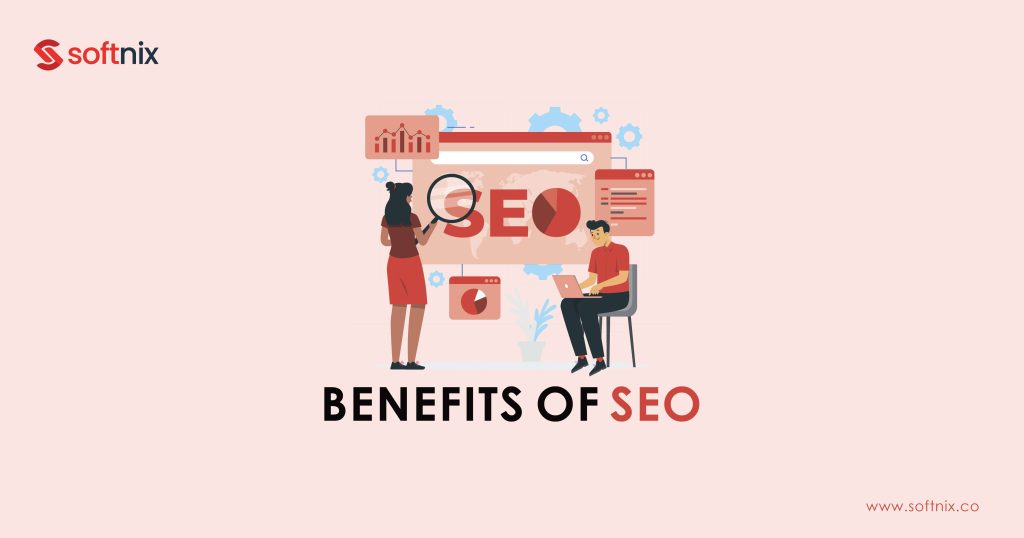
Understanding why SEO is important for your business reveals numerous benefits. It boosts your website’s visibility, attracts more traffic, and enhances user engagement. SEO also improves your brand’s credibility and can significantly increase sales by reaching more potential customers. Investing in SEO is crucial for competing effectively in the digital market, making your business more accessible and prominent online.
1. Why SEO is Essential for Businesses
SEO is vital for any business looking to increase its visibility and drive more traffic to its website. It helps your business stand out online, making it easier for potential customers to find you. Key benefits include:
- Boosting your site’s visibility in search engine results.
- Increasing the volume of potential customers visiting your site.
- Enhancing the overall online presence of your business.
This strategic tool is not just about immediate gains but also about building a long-term foundation that continually draws in traffic and promotes business growth.
2. Impact of SEO on Website Performance and Traffic
SEO significantly enhances website performance and user engagement. By optimizing your site, you ensure it not only attracts visitors but also keeps them engaged. Key aspects include:
- Improving site speed and usability, which enhances user experience.
- Increasing traffic through better visibility and higher search rankings.
- Measuring the success of SEO strategies through detailed analytics.
Effective SEO practices lead to a more enjoyable user experience, encouraging visitors to stay longer and interact more, which in turn boosts conversion rates.
3. Long-term vs Short-term Benefits
SEO offers both immediate improvements and long-term benefits. While some strategies provide quick boosts, the real value of SEO is seen over time. Important points to consider are:
- Immediate impacts like quick traffic increases from targeted campaigns.
- Long-term growth through sustained efforts, improving rankings, and visibility.
- Continuous return on investment as SEO adapts to changing algorithms and market conditions.
Investing in SEO is a strategic decision that pays off well beyond the initial implementation, supporting ongoing business growth and market presence.
4. Competitive Advantage through SEO
Gaining a competitive edge in the market is crucial, and SEO plays a key role in outperforming competitors. Effective SEO strategies help you stay ahead by:
- Positioning your website at the top of search results.
- Analyzing competitors’ tactics and refining your own to stay ahead.
- Developing a strong SEO strategy that continuously evolves with market trends.
This strategic approach ensures your business remains at the forefront of your industry, attracting more customers and establishing a dominant online presence.
5. Building Brand Authority and Trust
SEO is instrumental in building brand authority and trust. By appearing consistently in search results, your business becomes a familiar and trusted name among consumers. Key elements include:
- Enhancing your brand’s credibility through high search rankings.
- Establishing trust by providing valuable content and a great user experience.
- Building authority in your industry through strategic content and SEO practices.
A strong SEO strategy not only improves visibility but also helps build a reputation as a reliable and authoritative source in your market, fostering customer loyalty and trust over time.
Setting an SEO Budget
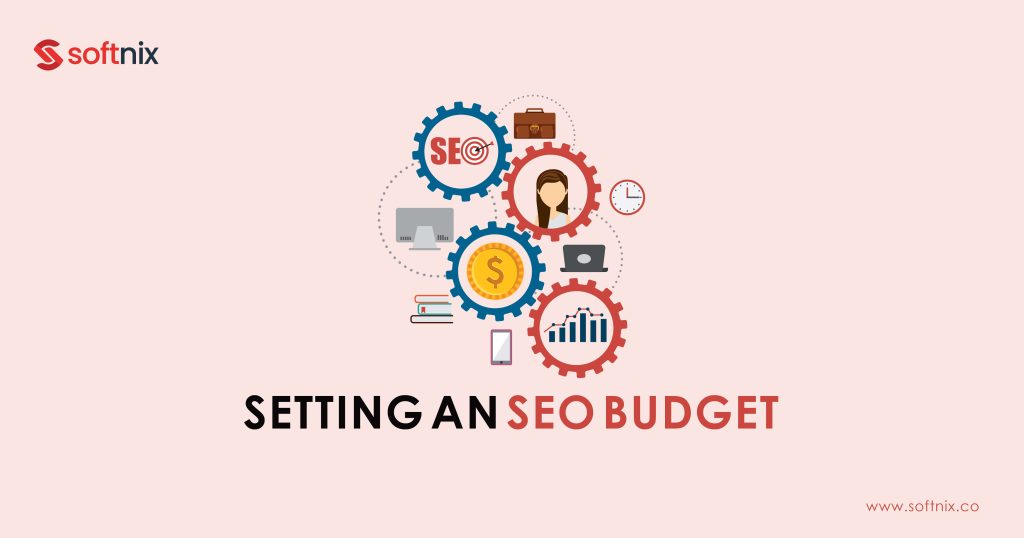
Setting an SEO budget is crucial for effective digital marketing. It ensures you have a clear plan for your spending and expectations for returns on investment (ROI). A well-defined budget helps manage costs while aiming for specific marketing goals. According to Moz’s industry survey, businesses that set an SEO budget tend to see more predictable and successful outcomes from their SEO efforts. This approach keeps your marketing efforts on track and financially accountable.
1. How to Determine a Suitable Budget for SEO
Setting the right SEO budget requires understanding your market and comparing industry averages. To effectively plan your SEO spending, consider these key points:
- Review industry benchmarks to get a baseline of typical SEO costs.
- Analyze your business size and revenue to align your budget proportionally.
- Consider the competitive landscape of your industry, which might require higher investment.
- Factor in your specific business goals and how quickly you want to achieve results.
These steps ensure your SEO budget is realistic and grounded in industry data, helping you to allocate funds strategically and effectively. A well-planned budget not only maximizes your potential returns but also prevents overspending, making it crucial for optimizing your marketing investments.
2. Balancing Cost and Expected Results
Achieving an optimal return on investment (ROI) with SEO involves balancing costs with the expected outcomes. Prioritize your SEO tasks to align with your budget and goals:
- Focus first on high-impact SEO activities that offer quick wins.
- Allocate the budget to both short-term gains and long-term strategies.
- Regularly review the effectiveness of spent money against the gains.
- Evaluate which strategies contribute most significantly to your business objectives and adjust funding accordingly.
This balanced approach helps maximize the impact of your budget, ensuring you invest wisely in areas that offer the best returns. It encourages continuous assessment and reallocation of resources to enhance both immediate and future business performance.
3. Evaluating SEO Costs Against Potential ROI
Calculating the ROI of SEO initiatives involves understanding both the direct and indirect benefits. To effectively measure your SEO investment, consider the following:
- Use performance indicators like traffic increase and conversion rates to gauge success.
- Analyze both short-term and long-term impacts on sales and customer engagement.
- Compare your SEO spending against these performance metrics to determine ROI.
- Continuously track and update your ROI calculations to reflect changes in strategy or market conditions.
This evaluation helps you understand the effectiveness of your SEO strategies and justify the costs associated with different SEO actions. It also guides future investment decisions, ensuring that each dollar spent maximizes value to the organization.
4. Budgeting for Different Types of SEO Services
Effective budgeting for SEO services requires a clear understanding of what each service offers and its potential impact. When allocating funds for SEO, consider:
- Distinguishing between basic SEO services and advanced strategies based on your needs.
- Allocating funds based on potential impact to ensure efficient use of resources.
- Tailoring your budget to cover a range of SEO activities from technical improvements to content creation.
- Setting aside a portion of the budget for unexpected opportunities or necessary adjustments.
A strategic approach to budgeting allows you to cover all necessary aspects of SEO without overspending, ensuring each dollar contributes to your overall business goals. It also provides flexibility to adapt as your business needs and market dynamics evolve.
5. Adjusting Budget Based on Performance and Goals
Flexible budgeting in SEO means adjusting your spending based on performance and strategic goals. To maintain an adaptable budget:
- Monitor the outcomes of your SEO activities to see what delivers the best results.
- Be ready to shift funds towards more effective strategies as needed.
- Use performance data to support budget adjustments and justify increases or cuts.
- Stay responsive to new opportunities and market changes that may necessitate budget reallocations.
This dynamic approach to budgeting ensures your SEO strategy remains effective and responsive to changing market conditions and business objectives. It allows for proactive adjustments, ensuring that your SEO efforts are always aligned with the most current business strategies and market opportunities.
Choosing the Right SEO Provider
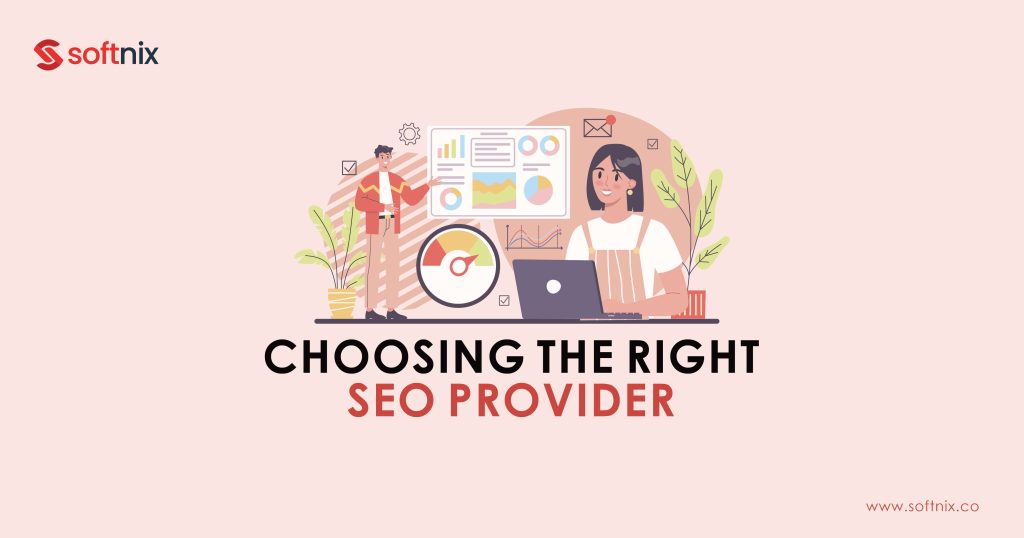
Selecting the right SEO provider is key to boosting your ROI and enhancing your website’s visibility. The best providers apply proven strategies and expertise tailored to your business goals, improving your online presence.
A fact from Clutch reveals that businesses prioritizing provider track records and clear communication typically experience better outcomes and satisfaction. This careful selection ensures your SEO investment yields strategic and effective results.
Criteria for Selecting an SEO Agency
When choosing an SEO agency, consider their expertise, experience, and reputation to ensure they can meet your business needs. Key factors to include in your evaluation are:
- Expertise in your specific industry or niche.
- A track record of successful projects and client satisfaction.
- A good reputation in the market, evidenced by reviews and testimonials.
Understanding these factors helps you select an agency that is well-suited to boost your online presence effectively. This strategic approach ensures that you partner with a provider capable of achieving your desired outcomes. Additionally, assess their transparency and willingness to educate you about the process, which can be crucial for long-term partnerships.
Comparing Agencies, Freelancers, and Automated Services
Choosing between SEO agencies, freelancers, and automated services depends on your specific needs and budget. Consider the pros and cons of each:
- Agencies offer comprehensive services and team support but may cost more.
- Freelancers provide personalized service, often at a lower cost, but might handle fewer services.
- Automated services are cost-effective and consistent but lack the personal touch.
Evaluating these options helps you find the best fit for your business, balancing cost, expertise, and the level of service required. Think about the scale of your projects and the level of customization you need, agencies might be better for large-scale implementations, while freelancers could be ideal for smaller, more focused tasks.
Notable SEO Service Providers
When looking for SEO services, consider notable providers like Softnix, OuterBox, Trinity Insights, and More Visibility. These companies are recognized for:
- A strong reputation and proven track record.
- Positive case studies and client testimonials.
- A range of services catering to various business sizes and industries.
Choosing a reputable provider ensures you receive quality service that can significantly improve your online marketing efforts. Their proven strategies and success stories offer confidence in your investment. Investigate their specific areas of expertise and how they align with your business objectives to ensure the best fit.
Questions to Ask Potential SEO Providers
To ensure alignment with your business needs, it’s crucial to ask potential SEO providers the right questions. Some key inquiries include:
- How do they tailor their strategies to meet specific business goals?
- What metrics do they use to measure success?
- Can they provide examples of similar businesses they have helped?
Asking these questions helps you understand whether the provider can meet your expectations and contribute to your business’s growth. This vetting process is vital for finding a partner that aligns with your strategic objectives. Also, inquire about their approach to changes in SEO practices and how they stay updated with Google’s algorithm updates.
Understanding SEO Contracts and Terms
Understanding the terms of SEO contracts is crucial before finalizing any agreements. Key aspects to focus on are:
- Specific services included and their deliverables.
- Terms of negotiation to ensure favorable conditions.
- Clarity on payment terms, duration, and conditions for contract termination.
Grasping these contract details helps you negotiate terms that protect your interests and ensure a fair agreement. It’s essential for establishing a clear and mutually beneficial relationship with your SEO provider. Ensure that the contract also includes provisions for regular communication and updates, aligning both parties on expectations and deliverables.
Communication and Reporting Standards
Clear communication and regular reporting are essential for monitoring the progress of your SEO efforts. Setting these standards from the start ensures transparency and allows you to stay informed about your SEO campaign’s effectiveness. Standards to consider include:
- How frequently the provider will report on progress?
- Performance metrics will be tracked and reported.
- The clarity and detail included in communication and reports.
. Regular updates and clear communication help build trust and facilitate ongoing adjustments to optimize results. Make sure that the reports are comprehensive yet easy to understand, providing both high-level insights and detailed performance metrics.
Additional Considerations for SEO Cost
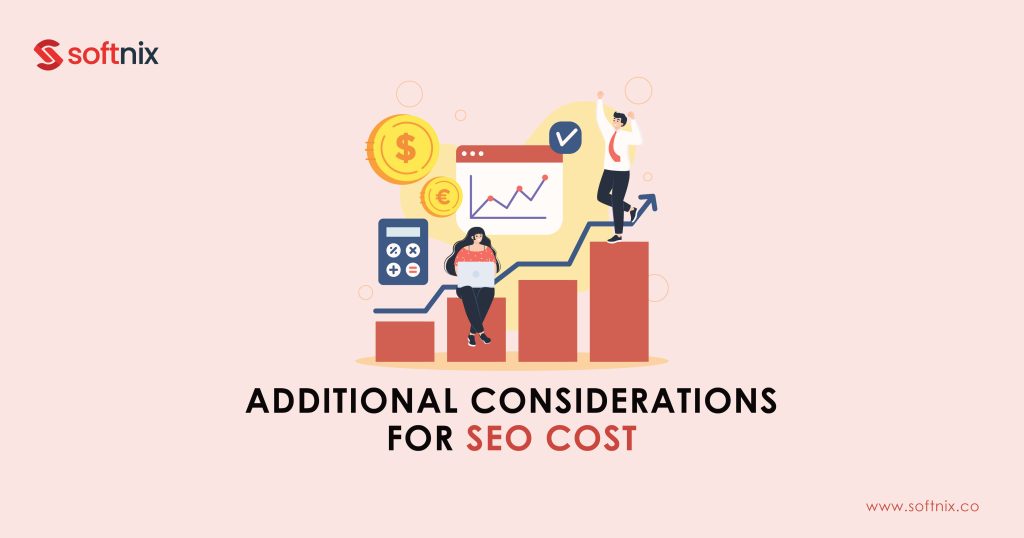
SEO Tools and Software Costs
SEO tools and software are essential for optimizing your online presence effectively. These tools help in keyword research, site analysis, and performance tracking. Pricing for these tools varies:
- Some basic tools are free, but more advanced features usually require a subscription.
- Costs can range from $30 to over $100 per month for comprehensive tool suites.
- Investing in the right tools enhances the precision and effectiveness of your SEO efforts.
These costs are a crucial part of your SEO budget because they provide the necessary data and analytics to inform and improve your strategies. Choosing the right tools can significantly impact your SEO success, making it essential to invest wisely based on your specific needs.
In-house SEO vs. Outsourced SEO
Deciding between in-house and outsourced SEO involves weighing the pros and cons of each approach based on your business’s unique requirements:
- In-house SEO allows for better control and integration with company culture but can be resource-intensive.
- Outsourcing to SEO agencies or freelancers can be cost-effective and taps into specialized expertise but may lack some direct oversight.
- Cost comparisons often show that outsourcing can be more economical for small to medium-sized businesses.
The Role of AI and Automation in SEO
AI and automation are transforming SEO by making processes more efficient and insights more actionable. The impact on costs and operational efficiency includes:
- Automated tools can reduce the time needed for data analysis and report generation.
- AI-driven SEO tools often come at a higher initial cost but can lead to long-term savings and improved outcomes.
- They enable more personalized SEO strategies at scale, potentially increasing return on investment.
As technology evolves, the role of AI in SEO is expected to grow, making it crucial for businesses to keep abreast of these trends and incorporate them into their strategies for enhanced effectiveness and competitive advantage.
Ethical SEO Practices and Avoiding Black-Hat Techniques
Ethical SEO practices are crucial for building trust and maintaining your site’s integrity. Avoiding black-hat techniques, which can lead to penalties from search engines, involves:
Each option has its strategic benefits depending on your company’s scale, budget, and long-term marketing goals. Understanding these can help you make an informed decision that aligns with your business objectives and operational style.
- Adhering to search engine guidelines to enhance your site’s long-term ranking potential.
- Implementing sustainable strategies that focus on quality content and genuine user engagement.
- Understanding the risks associated with unethical SEO tactics, including potential site bans.
Employing ethical SEO strategies not only avoids penalties but also builds a reputable and trustworthy online presence. This approach ensures that your SEO efforts are both effective and sustainable over time.
The Impact of Algorithm Updates on SEO Costs
Search engine algorithm updates can significantly impact SEO strategies and costs. Staying compliant requires:
- Continual monitoring of updates to understand their implications on your site.
- Adjusting SEO strategies quickly to align with new guidelines and maintain rankings.
- Allocating budget for ongoing training and tool upgrades to handle these changes effectively.
These updates often necessitate additional investment in both time and resources to ensure that your SEO practices remain effective and compliant. Adapting swiftly to these changes is crucial for maintaining your site’s visibility and avoiding penalties.
SEO ROI and Value
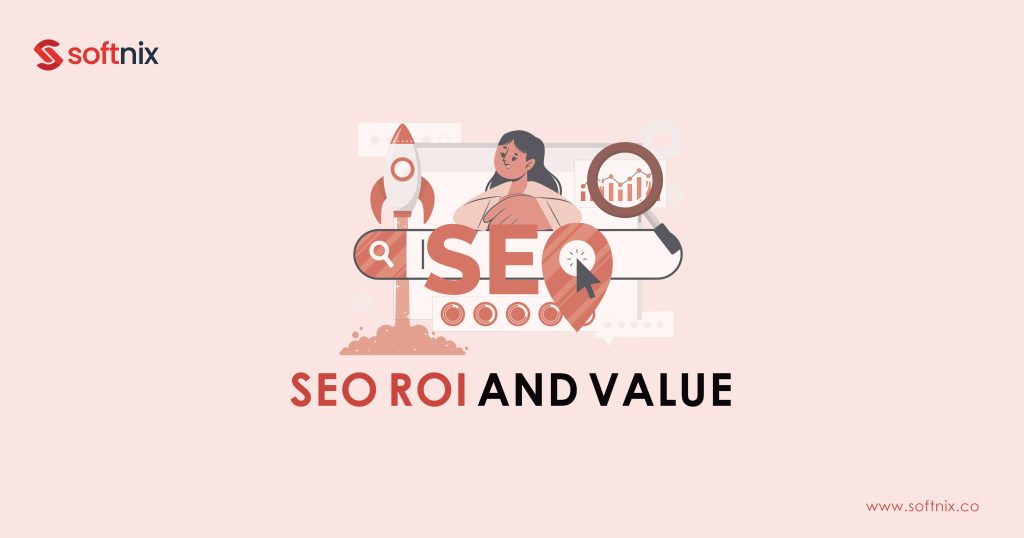
Understanding SEO’s return on investment (ROI) is crucial for gauging the value it brings to your business. Effective SEO strategies not only boost your site’s rankings but also enhance visibility and increase visitor traffic, directly impacting your sales and revenue.
A fact from BrightEdge Research states that organic search drives more than 50% of website traffic, highlighting SEO’s significant role in digital marketing success. Investing in SEO pays off by substantially increasing your online presence and driving business growth.
Measuring the ROI of SEO Efforts
To effectively measure the ROI of SEO, focus on key metrics like traffic growth, conversion rates, and keyword rankings. These indicators help track and evaluate the impact of SEO on your business. A fact from the Search Engine Journal indicates that SEO can significantly increase conversion rates by targeting specific, intent-driven keywords. Using these metrics provides clear insights into the effectiveness of your SEO strategies.
Key Performance Indicators (KPIs) for SEO
Important KPIs for monitoring SEO success include organic traffic, click-through rates (CTR), and backlink quality. Tracking these KPIs helps gauge the health and effectiveness of your SEO efforts. According to HubSpot, companies that analyze their KPIs regularly are more likely to implement successful marketing strategies. Monitoring these indicators is crucial for understanding how well your SEO is performing and where adjustments may be needed.
Long-term Value of Sustained SEO Efforts
The long-term benefits of sustained SEO efforts include improved site authority, consistent traffic growth, and increased brand visibility. Continuous investment in SEO helps in building a durable online presence that supports ongoing business growth. Studies, like those from Moz, show that businesses with a strong SEO foundation achieve better overall market stability and ROI. Committing to long-term SEO strategies ensures lasting benefits and competitive advantage.
How SEO Integrates with Overall Marketing Strategy
Integrating SEO with your overall marketing strategy enhances the effectiveness of both. SEO works synergistically with other channels like social media and email marketing to boost overall campaign performance. A study from MarketingProfs highlights that businesses that integrate SEO with other marketing efforts see up to a 50% increase in effectiveness. This integration ensures a comprehensive approach to online marketing, maximizing reach and impact across various platforms.
Final Thoughts
Wrapping up, and getting a handle on SEO pricing pays off. Investing in top-notch SEO services can seriously boost your online visibility and bring in great returns. Just make sure to carefully consider what your specific SEO needs are and pick strategies that mesh well with your goals. By spending smart and choosing the right services, you’ll amp up your website’s performance and snag a solid edge over the competition.
FAQs related to SEO Pricing
1. What factors influence SEO pricing?
SEO pricing is influenced by several factors including the scope of the project, the expertise and reputation of the agency, the competitiveness of your industry, geographic location, and the specific services required such as content creation, link building, and technical SEO improvements. The more comprehensive and customized the services, the higher the cost.
2. How much should I expect to pay for SEO services?
SEO costs can vary widely depending on your needs. Small businesses might spend a few hundred dollars a month on basic services, while larger enterprises could easily invest several thousand dollars a month on more comprehensive strategies. Always get multiple quotes to understand what fits your specific requirements best.
3. Is investing in SEO worth it for small businesses?
Yes, investing in SEO is highly beneficial for small businesses. It helps increase visibility on search engines, attract more targeted traffic, and improve conversion rates, all of which are crucial for growth and competitive advantage in today’s digital landscape.
4. Can I do SEO on my own or should I hire a professional?
Basic SEO can be managed on your own if you have the time and willingness to learn. However, professional SEO services offer advanced expertise, strategic insights, and access to premium tools that can significantly enhance your results, particularly in competitive sectors or large-scale projects.
5. What are the main types of SEO services?
The main types include on-page SEO (optimizing content on your website), off-page SEO (enhancing the site’s reputation through backlinks), technical SEO (improving the website’s backend structure), and local SEO (optimizing for local search results). Each type addresses different aspects of your website’s performance and visibility.
6. How long does it take to see results from SEO?
The time it takes to see results from SEO can vary widely, but generally, noticeable improvements in organic traffic and search rankings can be seen within 3 to 6 months. The exact timeline can depend on the competitiveness of your industry, the current state of your website, and the effectiveness of the implemented SEO strategies.
7. What is the difference between cheap and expensive SEO services?
Cheaper SEO services might offer limited or generic strategies and could potentially involve risky tactics that jeopardize your site’s credibility. Expensive SEO services usually provide more customized strategies, and ongoing support, and use ethical practices that are aligned with Google’s guidelines, ensuring sustainable improvements.
8. Why is continuous investment in SEO important?
SEO is not a one-time task; it requires continuous investment because search engines frequently update their algorithms, and new competition continually emerges. Regular investment helps maintain and improve your rankings, adapt to algorithm changes, and exploit new opportunities for visibility and traffic.
9. What should I look for in an SEO provider?
Key aspects to look for in an SEO provider include a strong track record, transparency in reporting and strategy, positive client testimonials, and a clear understanding of the latest SEO trends and practices. Also, ensure they offer specific strategies tailored to your industry and business goals.
10. How do I measure the ROI of SEO?
To measure the ROI of SEO, track key metrics such as increases in organic traffic, improvement in search rankings, and conversion rate enhancements. Use analytic tools like Google Analytics to quantify these metrics and relate them to your SEO spending to assess profitability and effectiveness.
11. What are KPIs in SEO?
Key Performance Indicators (KPIs) in SEO are metrics used to assess the effectiveness of your SEO strategies. Common KPIs include organic traffic levels, keyword rankings, conversion rates from organic search, backlink quality and quantity, and page loading speed. These metrics help track performance and guide strategic decisions.
12. Can SEO impact the user experience on my site?
Yes, SEO significantly impacts user experience. Optimizing for SEO often involves enhancing the website’s loading speed, improving navigational structure, and creating quality content, all of which contribute to a better user experience. This, in turn, can lead to increased user engagement and higher conversion rates.
13. What are black-hat SEO techniques?
Black-hat SEO techniques are unethical practices aimed at improving rankings through tactics that violate search engine guidelines. Examples include keyword stuffing, cloaking, and using private link networks. These practices can result in severe penalties from search engines, including drops in ranking or even complete de-indexing.
14. How do algorithm updates affect SEO strategies?
Algorithm updates often change the criteria search engines use to rank websites, affecting how sites are indexed and displayed in search results. Staying updated with these changes and adjusting your SEO strategies accordingly is crucial to maintaining or improving your rankings. Regular audits and adaptability in tactics are essential.
15. What is local SEO, and why is it important?
Local SEO optimizes your site to capture more traffic from searches with local intent. This is particularly important for businesses that operate on a regional basis and can significantly increase visibility among local customers. Effective local SEO includes optimizing your Google My Business listing, local citations, and location-based keywords.

